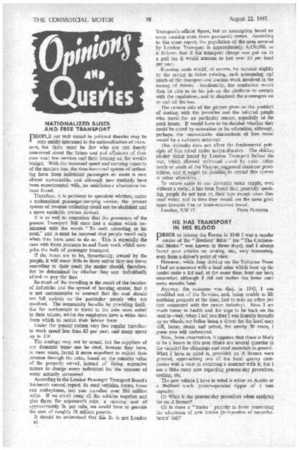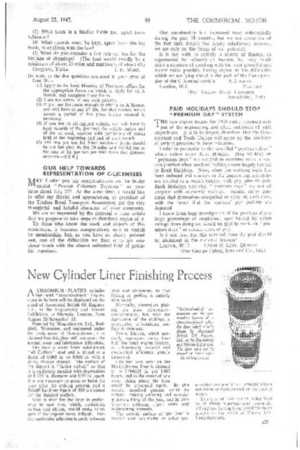NATIONALIZED BUSES AND FREE TRANSPORT
Page 44

Page 47

If you've noticed an error in this article please click here to report it so we can fix it.
pEOPLE not well versed in political theories may be only mildly interested in the nationalization of transport, but there must be few who are not keenly concerned about the future cost and efficiency, of their own local bus services and their bearing on the weekly budget. With the increased speed and carrying capacity of the modern bus, the time-honoured system of collecting fares from individual passengers en route is now almost unworkable, and although new methods have been experimented with, no satisfactory alternative has been found.
Therefore, it is pertinent to speculate whether, under 1. nationalized passenger-carrying service, the present system of revenue collecting could not be abolished and a more equitable system devised.
It is as well to remember that the promoters of the present Transport Bill once. had a slogan which terminated with the words "To each according to his need," and it must be assumed that people travel only when they have need to do so. This is especially the case with those journeys to and from work which comprise the bulk of passenger transport.
If the buses are to be, theoretically, owned by the people, it will mean little to them unless they can travel according to their need; the matter should, therefore, not be determined by whether they can individually afford to pay the fare.
So much of the travelling is the result of the location of industries and the spread of housing estates, that it is not unreasonable to contend that the cost should not fall entirely on the particular people who are involved. The community benefits by providing facilities for workpeople to travel to the jobs most suited to their talents, whilst the employers have a wider field from which to recruit their labour force.
Under the present system very few regular travelleis to work spend less than £.5 per year, and many spend up to £30.
The analogy may not be sound, but the suppliers of our domestic water can be cited, because they have, in most cases, found it more expedient to collect their revenue through the rates, based on the rateable value of the property served, instead of fitting expensive meters to charge every individual for the amount of water actually consumed.
According to the London Passenger Transport Board's thirteenth annual report, its road vehicles, trams, buses and trolleybuses, last year travelled over 386 million miles. If we could lump all the vehicles together and give them, for argument's sake, a running cost of approximately 2s. per mile, we would have to provide the sum of roughly 38 million pounds.
It should be understood that this 2s. is not London B6 Transport's official figure, but an assumption based on some running costs from provincial towns. According to this same report, the population of the area covered by London Transport is approximately 9,450,000, so it follows that if the transport charge was put on as a poll tax it would amount to just over £4 per head per year.
Running costs would, of course, be reduced slightly by the saving in ticket printing, cash accounting and much of the transport and clerical work involved in the issuing of tickets. Incidentally, the conductor would then be able to do his job on the platform to comply with the regulations, and to shepherd the passengers on to and off the bus.
The reverse side of the. picture gives us the problem of dealing with the juveniles and the leisured people who travel for no particular reason, especially at the peak hours. It would have to be decided whether they could be cured by saturation or by education, although, perhaps, the unavoidable discomforts of free travel would be a sufficient deterrent.
This difficulty does not affect the fundamental principle of free travel under nationalization. The shilling all-day ticket issued by London Transport before the war, which allowed unlimited travel by tram either north or south of the Thames, suggested immense possibilities, and it might be possible to extend this system in .other directions.
To return again to our domestic water supply, even .without a meter, it has been found that, generally speaking, people do not turn on their taps except when they need water, and in time they would use the same good sense towards free or State-endowed travel.
London, S.W.15 FRED PLEDGER
HE HAS TRANSPORT IN HIS BLOOD
pRIOR to joining the Forces in 1940 I was a regular 1 reader of the. "Hauliers' Bible" (as "The Commercial Motor" was known in those days), and I always found your articles on costing, etc., very, interesting, even from a driver's point of view.
However, white Jeep driving on the Volturno Front I had an argument with a land mine which bent up the model quite a lot and, at the same time, bent my back somewhat, although I did not realize the latter entd some months later.
Anyway, the outcome was that, in 1945, I was invalided out of the Services, and, being unable to lift anything properly at the time, had to take an office job (not connected with the motor industry). Now I am much better in health and the urge to be back on the road is—well, when I tell you that I was literally brought up on wheels, my father being a driver for the local corn mill, horse, steam and petrol, for nearly 30 years, I guess you will understand.
Now, from observation, it appears that there is likely to be a boom in this area (there are several quarries in the vicinity) for chippings and road materials in general. What I have in mind is, provided an A licence were granted, approaching one of the local quarry companies with a view to obtaining a contract with it; but I am a little rusty now regarding present-day procedure, costing, etc.
The new vehicle 1 have in mind is either an Austin or a Bedford s.w.b. power-operated tipper of 5 tons capacity.
(1) What is the present-day procedure when applying for an A licence?
(2) Is there a " trades " priority in force concerning the allocation of new lorries (irrespective of manufacturers' list)? (3) What taxes is a haulier liable for, apart from vehicular?
(4) What records must be kept, apart from the log book, to conform with the law?
(5) What do you consider a fair rate per ton for the haulage of chippings? (The lead would usually be a minimum of about 20 miles and maximum of about 40.) Gargrave, Yorks. J. H. WANE, (In reply to the five questions contained in your letter of June 28:-
(1) Apply to the local Ministry of Transport offices for the appropriate forms on which to apply for an A licence, and complete those forms. (2) I am not aware of any such priority. (3) If you are fortunate enough to obtain an A licence, you will have to pay £7 10s. for that licence, which covers a peria of five years before renewal is necessary.
(4) If you use an oil-engined vehicle, you will have to keep records of the journeys the vehicle makes and of the oil used, together with particulars of stocks held at the beginning and end of each month.
(5) The rate per ton fOr 5-ton minimum loads should be not less than 8s. for 20 miles and should rise at the rate of 3d. per ton per mile from that distance onwards.—S.T.R.1 OUR HELP TOWARDS REPRESENTATION OF C-LICENSEES
MAY I offer you my congratulations on the leader 'headed "Protect C-licence Freedom" in your issue dated July 25? At the same time. I would like to offer my thanks and appreciation, as president of the Traders Road Transport Association, for the very thoughtful and helpful character of your comments.
We are so impressed by the material in your article that we propose to take steps to distribute copies of it.
To those who know the work and objects of this association, it becomes comparatively easy to recruit its membership, but, as you have so clearly pointed out, one of the difficulties we face is to get into closer touch with the almost unlimited field of potential members Our membership has increased most substantially during the past 18 months, but we are conscious of the fact that, despite this highly satisfactory increase, we are only on the fringe of our potential.
It is not with us entirely a matter of finance, as represented by subscription income, but very much more a question of speaking with the most powerful and united voice possible, having regard to the difficulties which we see lying ahead in the path of the free opera tion of the C-licensed vehicle. A. jERRETT,
London, W.1. President (For Traders Road Transport Association, Ltd.).
PAID HOLIDAYS SHOULD STOP PREMIUM DAY" SYSTEM
JHE new export targets for 1948 make increased output of the engineering and allied industries of vital importance. It is to be hoped, therefore, that the Government and Trade Unions will agree on the abolition of certain practices in these industries.
I refer in particular to the so-called "premium days" which follow every Bank Holiday. Men working on "premium days" are entitled to overtime rates, a system justified when workers' holidays were largely limited to Bank Holidays. Now, when the working week has been reduced and workers in the engineering industries are entitled to a week's holiday with pay, plus six paid Bank Holidays annually, " premium days" are out of keeping with economic realities. Indeed, many concerns find themselves compelled to close on such days, with the result that the workers' pay packets are depleted I know from long investigation of the problem that a large percentage of employees, now barred by union rulings from doing so, would be glad to work on "premium days" at normal rates of pay.
Is it not time that this survival from the past should be abolished in the national interest?
London, W.12. LEWIS a LEVY, Director (For George Cohen, Sons and Co., Ltd.)
















































































